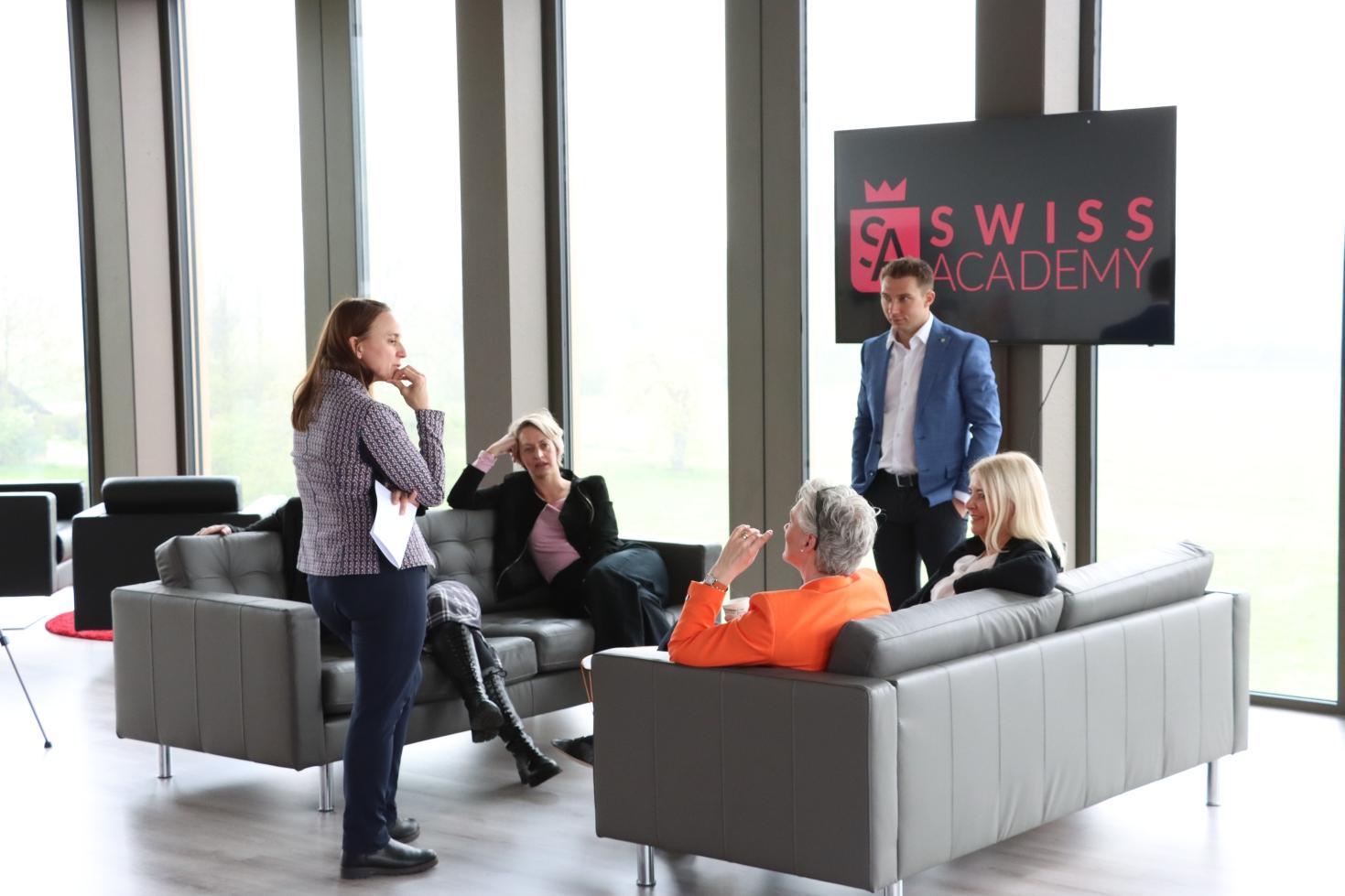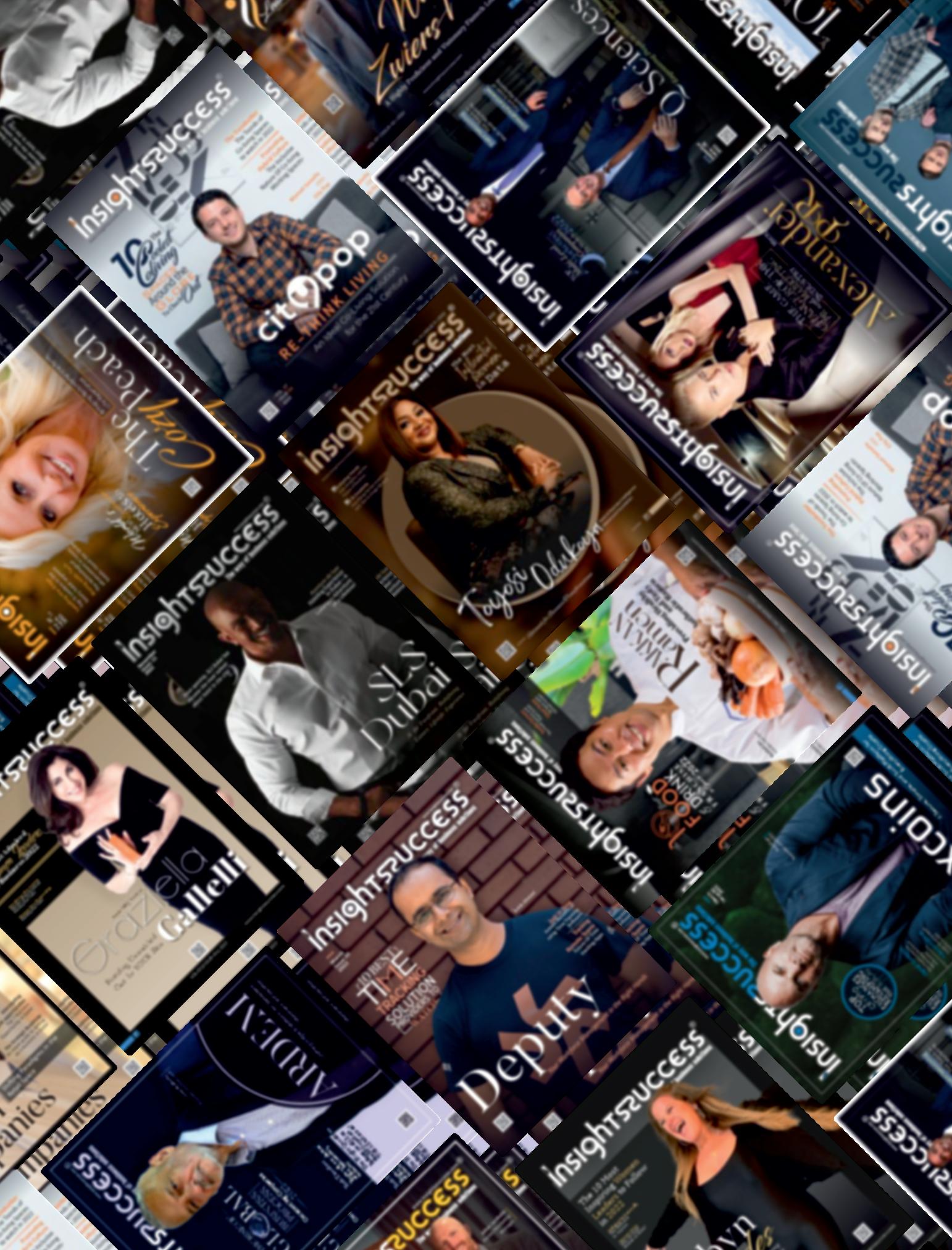




































08. Simon Hofer
The Communication Alchemist
14.
Lessons from the Top:CEO Strategies for ScalingaBusiness
Work-life Integration for BusyFounders: Practical Tips MaintainingProductivity&Well-being 18.
EnhancingGlobal Leadership:The Impact of Cultural Intelligence
LeadershipStyles: ComparingAutocratic, Democratic, and Laissez-FaireApproaches

The only limit to our realization of tomorrow will be our doubts of today. , ,
- Franklin D. Roosevelt





Inthisdigitalworld,whatweneedtodayisalittle
theoryandalotofpracticalknowledgeandapplication.
Knowledgeisnotaproblem,butitsapplicationandtheway itisconveyedare.Assomeonewhoconstantlyneedsnew input,SimonHoferrarelytakesabreakandconsumes informationthroughbooksandpodcasts.
Asanexperiencedpublicspeaker,Simonpreciselyuseshis uniquespeakertrainingprograms.Additionally,heisalso theCEOofSwissAcademySACTAG,anInternational KeynoteSpeaker,entrepreneur,andbest-sellingauthor
Simon,thebookwormwithasurprisingstreetwiseedge, divesintotheworldofcommunication,callingitthe "unsunghero"ofsuccess,especiallyinbigcompanies.He flipsthroughthepagesofhistory,pointingouthowtheoldschoolwayofgettingthingsdone—shoutingtheloudest, wieldingpower,orrelyingonfancytitles—hasreacheda deadend.
Instead,Simon,thestreetwiseoperator,seespromisein leaderswhocanrallythetroopswithinspiringwords, emotionalconnection,andagenuinewalk-the-walk approach.He'sseenfirsthandhowthebarking-orderbosses fromtheboardroom(C-levels,hecallsthem)areburning outatrecordrates.Newgadgetsandgizmoswon'tsolve this,heargues.Whatweneedisacommunicationrevolution!
Simon,akeenobserverofhumannature,emphasizesthe needtorebuildconnections.Hewantstoseefolkstalking toeachother,notateachother,andditchingthewhole "titlesandterritories"game.It'stimetobreakdownthe silosandbuildsomethingbettertogether,that'stheSimon way.
SwissAcademySACTAGhasestablisheditselfasa valuablepartnerforSMEsandcorporationsinaremarkably shorttimeframe.Thissuccessisattributedtotheirunique approach:"Neurocommunication."
SwissAcademydoesn'tstopthere.Recognizingthe importanceofbothinternalmessagingandexternal presentation,theyofferacomprehensivesolution.Its expertiseinNeurocommunicationtechniquestackles
internal,external,andevencrisiscommunicationneeds. Additionally,theirteamofpublicspeakingprofessionals empowerscompaniesandmanagerstopresentthemselves withconfidenceandimpact.
Thistwo-prongedapproach,encompassingboththe"what" (Neurocommunication)andthe"how"(publicspeaking skills),isarareandhighlyvaluablecombinationforclients. ItallowsSwissAcademytonotonlycraftpersuasivesales pitchesusingNeurocommunicationbutalsoequipclients withthedeliveryskillstopresentthemflawlessly
Theartofcaptivatinganaudiencehingesonmasteringa fewkeyprinciples.Byfocusingonthesethreecrucial elements,speakerscaneffectivelyengagetheirlistenersand leavealastingimpression.
Ÿ EntertainmentandHumor:Successfulpresentations movebeyonddryinformationdelivery.Injectinghumor andfosteringanentertainingatmospherecansignificantlyimproveaudienceretention.Eveninserious businesssettings,speakerswhodemonstrateawillingnesstolightenthemoodandavoidexcessiveseriousnesstendtoconnectbetter.
Ÿ AFocusedMessage:Aclearandconcisecentralidea formsthebackboneofacompellingpresentation. Speakersshouldidentifytheircoremessage,like "battery-poweredvehiclesarethefuture,"andensureall contentrevolvesaroundreinforcingthatcentraltheme. Avoiddilutingthemessagewithirrelevantdetailsor stories.
Ÿ AuthenticPresence:Themostchallengingyetimpactful elementisthespeaker'spresence.Connectingwiththe audiencerequiresgenuineengagementinthe"hereand now."Thisinvolvesmakingeyecontact,smiling,and displayingapproachability Whilemanyfindthisaspect difficult,it'saskillthatcanbehonedwithpractice.
Simon,theculturalanthropologist,divesintothetreacherousworldofcross-culturalcommunication.Hewarnsthat overlookingculturalnuancescanleadtomisunderstandings thatquicklyspiraloutofcontrol."There'snootherarena whereyoucangosowrong,sofast,"heemphasizes.
Recognizingthenear-impossibilityofmasteringevery culturalquirk,Simonproposesadifferentapproach.He advocatesforfocusingonthe"universalsimilarities"that bindhumanitytogether."Weallexperiencejoy,sorrow,

pain,andappreciation,"heargues.Bytappingintothese sharedemotionsandthemes,communicationacross culturesbecomesabridge,notabarrier
Simon,alifelonglearnerwithaninsatiablecuriosity, exemplifieshisdedicationtoaudienceengagement."The stageismytestingground,"hedeclares,referringtohis ownexperienceperformingonlargeplatforms.Thisallows himtointuitivelygraspwhatresonateswithaudiencesand whatfallsflat.
Beyondhispersonalexperience,Simonleveragesavast networkoftrainedspeakers.Thisconstantexchangeof ideasfuelshiscreativefire.Aself-proclaimedinformation sponge,Simon'sbrainisrarelyidle.Hedevoursknowledge throughasteadydietofatleast50booksayearand strategicallyutilizestraveltimetoabsorbinsightful podcasts.

Humilityremainsacornerstoneofhisapproach.Heoften reflectsonhisgrandfather'swisdom:"Themorewelearn, themorewerealizehowlittleweknow."Thisguiding principleensuresthathecontinuestoseekoutnew knowledgeandrefinehisunderstanding.
SwissAcademySACTAGemphasizesapractical approach,prioritizingreal-worldapplicationovertheoreticalknowledgereadilyavailablethroughonlineresources. Theyrecognizethattheabundanceofinformationatour fingertips—"Google,YouTube,orWikipedia"–canprovide awealthoftheory.However,thechallengeliesineffectivelyapplyingthatknowledge.
ThisiswhereSwissAcademyshines.Theirteam,composedofseasonedpublicspeakers,worldchampionsand politicexpertsunderstandsthespecificskillsthattranslate tosuccessinreal-worldscenarios.
Theytranslatethisexpertiseintoactionabletrainingfor theirclients,empoweringCEOsandothercompany representativestoconfidentlyconnectwithaudiences,be theyemployees,shareholders,orcustomers.
Highlightsacrucialpoint:theimportanceofpersonal credibility.Theyemphasize,"Itisimpossibletoconvince peopleofacompanyifthepersonisnotconvincing!"They advocateforprioritizingthespeaker'sauthenticityand persuasiveness.Thereasoningisclear:"OnlywhenI believeandtrustyouwillIdothesamewiththecompany." Byfosteringagenuineconnectionwiththeaudience,the speakerbecomesabridgebetweenthemselvesandthe companytheyrepresent.
Simontacklesafundamentalquestion:whattrulydrives success?HeenthusiasticallycitesJimRohn'squote,"Work harderonyourselfthanonyourjob,"highlightingthe importanceofself-improvement.
However,hedivergesfromthecommonadagethat "standingstillisgoingbackward."Heemphasizesthevalue ofintrospection."Weneedtotaketimetoobserve,"he argues.Thisinvolvesanalysingnotonlyouractionsbut alsothoseofothers.Byquestioning"why"and"if,"we engageinacriticalthinkingprocessthatcanleadto breakthroughs.
SimonunderscorestheimportanceofthisapproachatSwiss AcademySACTAG.Heemphasizesthatbytakingthetime toreflect,theycanidentifyopportunitiesforimprovement inprocessesandoveralloperations.Thiscommitmentto "meaningfulinnovation"istheirsecrettocreatingsignificantaddedvalueforclients.
Furtherdemonstratingtheirdedicationtogrowth,he highlightstheirregularpersonaldevelopmentseminars offeredtobothclientsandemployees.Thisensuresa companycultureofcontinuouslearningandimprovement.
SwissAcademySACTAGprioritizesatrifectaofsuccess: liquidity,profitability,andstability.However,itrecognizes thatfiguresalonedon'ttellthewholestory.Truesuccess hingesonpositivecustomerfeedback.This,theybelieve, canonlybeachievedbyprioritizingpeopleovernumbers.

"Westrivetoenrichourfactswithalotofunderstanding forpeople,"theystate,confidentthatthishuman-centric approachisthekeytolong-termsustainability.
Sustainablegrowth,accordingtoSwissAcademySACT AG,requirestargetedinnovation.Itcontinuouslyexplores waystoimprovecustomerreach,aimingforfaster,more efficient,andmoreconvenientsolutions.Traditionally, workshopsandtraininginvolvedtravel—eithertoclients' locationsortotheirfacilitiesinSwitzerland,whichboast excellentinfrastructure.Theappealoftheirbeautifuland well-equippedspacehasdrawnanincreasingnumberof clientstovisittheminperson.
Takinginnovationastepfurther,SwissAcademySACTAG hasplansforQ12025.Theyintendtolaunchaseriesof shortandengagingonlinevideocourses.Thesecommunicationcourseswillcatertoon-the-golearners,asthey'llbe structuredtofunctioneffectivelyaspodcasts(audio-only) aswellasvideolessons.
SwissAcademySACTAGchampionsactivelisteningasa cornerstoneoftheirsuccess.Theyemphasizetheimportanceofnotonlylisteningtotheirclientsbutalsostaying attunedtomarkettrends.Thiskeenawarenessallowsthem toidentifyemergingopportunitieswithdevelopment potential.
Onceapotentialprojectisidentified,theyconducta thoroughfinancialanalysis.However,SwissAcademy SACTAGacknowledgesthelimitationsofpurenumbercrunching.Theyincorporatean"Xfactor"–unforeseen circumstancesorvariables—intotheircalculations.Ifthe projectremainsfinanciallyviableafteraccountingforthis uncertainty,itwillmoveswiftlytowardsimplementation.
Beyondfinancialconsiderations,SwissAcademySACTAG valuesunderstandingandinspiration.Theybelievethat fosteringmutualunderstandingofdiverseviewpoints createsfertilegroundforinspiration.Thisinspiration,in
turn,fuelsinnovation,acrucialelementforastrong,stable, andhealthysociety.
Interestingly,SwissAcademySACTAGdrawsaparallel betweentheirownapproachandthesuccessofSwitzerland asanation.TheypointoutthatSwitzerlandisnotonly renownedforitsstabilityandsafetybutisalsoaglobal leaderininnovation.TheyhavehighlightedSwitzerland's toprankingintheGlobalInnovationIndex(foundedby BostonConsultingGroup)foroveradecade.Thisimpressivetrackrecordunderscoresthepowerofeffective listening,calculatedrisk-taking,andafocusonfostering inspirationforcontinuousimprovement.












Intoday'sinterconnectedworld, effectiveleadershiptranscends geographicalboundariesand culturaldivides.Asbusinessesexpand globallyandteamsbecome increasinglydiverse,thesignificance ofculturalintelligence(CQ)in leadershipcannotbeoverstated. Culturalintelligence,definedasthe capabilitytofunctioneffectivelyacross variousculturalcontexts,hasemerged asacrucialattributeforleaders navigatingthecomplexitiesofa globalizedmarketplace.Thisarticle explorestheprofoundimpactof culturalintelligenceonglobal leadership,highlightingitsrolein fosteringcollaboration,driving innovation,andachieving organizationalsuccess.
Oneoftheprimarywayscultural intelligenceinfluencesglobal leadershipisbyfosteringcollaboration andbuildingtrustwithinmulticultural teams.LeaderswithhighCQpossessa deepunderstandingofculturalnuances andareadeptatnavigatingcultural

differences.Byrecognizingand respectingdiverseperspectives,they createaninclusiveenvironmentwhere teammembersfeelvaluedand empoweredtocontribute. Moreover,leaderswithhighCQare skilledcommunicatorswhocanbridge culturalgapseffectively Theyadapt theircommunicationstyleand approachtoresonatewithindividuals fromdiversebackgrounds,thereby facilitatingclearerunderstandingand alignment.Asaresult,teamsledby culturallyintelligentleadersexperience enhancedcohesionandsynergy, leadingtoimprovedproductivityand performance.
Culturalintelligencealsoplaysa pivotalroleindrivinginnovationand creativitywithinorganizations.When leadersembraceculturaldiversityand encouragediverseperspectives,they unlockawealthofcreativepotential withintheirteams.Byleveraging differentculturalviewpointsand experiences,leaderscanstimulate innovation,leadingtothedevelopment ofgroundbreakingideasandsolutions.


Furthermore,culturallyintelligent leadersareadeptatfosteringaculture ofopennessandexperimentation.They createanenvironmentwhere individualsfeelcomfortableexpressing theirideasandchallengingthestatus quo,regardlessofcultural backgrounds.Thisfreedomtoinnovate withoutfearofjudgmentor misunderstandingfostersacultureof continuouslearningandimprovement, drivingorganizationalinnovationand competitivenessintheglobal marketplace.
Ultimately,theimpactofcultural intelligenceongloballeadership extendstoachievingorganizational successinamulticulturallandscape. Leaderswhoprioritizecultural intelligencearebetterequippedto navigatethecomplexitiesof internationalmarketsandadapttheir strategiestolocalcontexts successfully.Byunderstandingthe culturalpreferences,values,andnorms ofvariousstakeholders,theycantailor theirapproachestobuildstrong relationshipsandfostertrust.
Moreover,culturallyintelligentleaders aremoreeffectiveinmanaging multiculturalteamsandresolving conflictsthatmayariseduetocultural differences.Theypossesstheskillsto mediatedisagreementsandfacilitate constructivedialogue,leadingto mutuallybeneficialoutcomes.Asa result,organizationsledbyculturally intelligentleadersarebetterpositioned tocapitalizeonglobalopportunities andmitigaterisksassociatedwith culturalmisunderstandings.
EnhancedDecisionMaking:Leaders withhighculturalintelligencepossess abroaderperspective,enablingthemto makemoreinformedandculturally sensitivedecisions.Byconsidering
diverseviewpointsandunderstanding theculturalimplicationsoftheir choices,theycanmitigaterisksand capitalizeonopportunitiesindiverse markets.Thisabilitytomakeculturally informeddecisionsenhances organizationalagilityandresiliencein thefaceofglobalchallenges.
EffectiveCross-Cultural Communication:Culturalintelligence equipsleaderswiththeskillsnecessary tonavigatecross-cultural communicationeffectively.They understandthenuancesoflanguage, non-verbalcues,andcommunication stylesacrosscultures,enablingthemto conveymessagesclearlyandbuild rapportwithstakeholdersfrom differentbackgrounds.Effective communicationfosterstrustand strengthensrelationships,pavingthe wayforsuccessfulcollaborationsand partnershipsonaglobalscale.
TalentRetentionandEmployee Engagement:Culturallyintelligent leaderscreateinclusivework environmentswhereemployeesfeel valuedandrespected,irrespectiveof theirculturalbackgrounds.Thisfosters asenseofbelongingandloyalty amongteammembers,leadingto higherlevelsofemployeeengagement andretention.Byembracingdiversity andpromotingculturalsensitivity, leaderscanharnessthefullpotentialof theirworkforceandcultivateaculture ofhighperformanceandinnovation.
GlobalMarketExpansion:Inan increasinglyinterconnectedworld, culturalintelligenceisessentialfor organizationsseekingtoexpandinto newmarkets.Leaderswhounderstand theculturalnuancesofdifferent regionscantailortheirproducts, services,andmarketingstrategiesto resonatewithlocalconsumers effectively Thislocalizedapproach enhancestheorganization's
competitivenessandensuresits relevanceindiversemarkets,driving sustainablegrowthandprofitability
ConflictResolutionandRelationship Building:Culturalintelligence empowersleaderstonavigatecultural differencesandresolveconflictsthat mayariseinmulticultural environments.Byfosteringopen dialogue,empathy,andunderstanding, culturallyintelligentleaderscandeescalatetensionsandbuildbridges betweenindividualsorgroupswith divergentperspectives.Thispromotes harmonyandcooperationwithinteams andstrengthensrelationshipswith externalstakeholders,fosteringlongtermpartnershipsandcollaborations.



Inorganizationalmanagement,
leadershipstylesplayapivotal roleinshapingtheculture, productivity,andoverallsuccessofa teamorcompany.Amongthespectrum ofleadershipapproaches,three primarystylesstandout:autocratic, democratic,andlaissez-faire.Each stylecarriesitsowndistinct characteristics,advantages,and limitations,cateringtodifferent contextsandorganizationalneeds.This articleaimstodelveintothese leadershipstyles,offeringa comparativeanalysistoilluminatetheir nuancesandapplications.
Autocraticleadershipembodiesa hierarchicalstructurewheredecisionmakingauthorityiscentralizedwithin theleaderorasmallgroupof individuals.Inthisstyle,directivesare issuedwithlittletonoinputfrom subordinates,emphasizingstrict controlandadherencetotheleader's vision.Autocraticleaderstypically exertahighlevelofpowerand influenceovertheirteammembers, expectingpromptexecutionoftasks withoutmuchroomfordiscussionor dissent.
Theprimaryadvantageofautocratic leadershipliesinitsefficiencyand

agilityindecision-making.Withaclear chainofcommandandswift implementationofdirectives,thisstyle iswell-suitedforsituationsrequiring immediateactionorwhendecisive leadershipisparamount.Moreover, autocraticleadersoftenthrivein environmentswherehierarchical structuresarevalued,suchasmilitary organizationsoremergencyresponse teams.
However,autocraticleadershipcan fosterresentmentamongteam membersduetoitsauthoritarian nature,potentiallyleadingtolow moraleanddiminishedcreativity Furthermore,relianceonasingle leaderfordecision-makingcanresult inmissedopportunitiesforinnovation anddiversityofperspectives.
Incontrasttoautocracy,democratic leadershipembracesaparticipative
approachwheredecision-makingis decentralized,andinputfromteam membersisactivelysolicited.Under thisstyle,leadersengageinopen communication,encouraging collaborationandempowering employeestocontributeideasand opinions.Consensus-buildingand inclusivityarehallmarksofdemocratic leadership,fosteringasenseof ownershipandcommitmentamong teammembers.
Oneofthekeystrengthsofdemocratic leadershipisitsemphasisonemployee engagementandempowerment.By involvingindividualsinthedecisionmakingprocess,leaderstapintothe collectivewisdomoftheteam,leading toinnovativesolutionsandhigher levelsofjobsatisfaction.Additionally, democraticleaderstendtocultivatea cultureoftrustandtransparency,which bolstersmoraleandfosterslong-term loyalty.
However,thedemocraticleadership stylemaysufferfromslowerdecisionmakingprocesses,especiallyinlarge orcomplexorganizationswhere consensus-buildingcanbetimeconsuming.Moreover,insituations whereurgentactionisrequired, democraticleadersmaystruggleto assertauthorityandnavigate conflictingopinionseffectively
Laissez-faireleadershiptakesahandsoffapproach,grantingmaximum autonomytoemployeesand minimizingdirectsupervision.Leaders adoptingthisstyleprovideminimal guidanceandintervention,allowing individualstotakeownershipoftheir workandmakedecisions autonomously.Laissez-faireleaders typicallyprioritizefreedomand flexibility,trustingintheexpertiseand self-motivationoftheirteammembers.
Theprimaryadvantageoflaissez-faire leadershipliesinitspromotionof creativityandinnovation.Byaffording individualsthefreedomtoexplore ideasandapproachesindependently, thisstylefostersacultureof experimentationandrisk-taking,which canleadtobreakthroughinnovations. Moreover,laissez-faireleadershipis well-suitedforhighlyskilledandselfdirectedteams,where micromanagementwouldstifle productivityandcreativity
However,laissez-faireleadershipcan falterinenvironmentslackingclear goalsoraccountabilitystructures. Withoutsufficientguidanceor oversight,employeesmaystruggleto stayfocusedandalignedwith organizationalobjectives,leadingto inefficienciesandmissedtargets. Additionally,insituationsrequiring strongleadershiporcrisis management,theabsenceofdirect interventionmayexacerbatechallenges andimpedeprogress.
Adaptability:
Effectiveleadersrecognizethatno singleleadershipstylefitsallsituations perfectly.Theypossesstheflexibility toadapttheirapproachbasedonthe specificchallenges,goals,and dynamicsoftheirteamororganization. Bybeingversatileintheirleadership style,theycannavigatediverse scenarioswithagilityand effectiveness.
Emotional Intelligence:
Regardlessoftheleadershipstyle employed,emotionalintelligenceplays acrucialroleinbuildingrapport, fosteringtrust,andnavigating interpersonaldynamics.Leaderswith highemotionalintelligencepossess empathy,self-awareness,andstrong interpersonalskills,enablingthemto
connectwithteammembersona deeperlevelandinspirecollaboration andcommitment.
Situational Leadership:
Theconceptofsituationalleadership, popularizedbyPaulHerseyand KennethBlanchard,emphasizesthe importanceoftailoringleadership behaviorstothereadinessormaturity levelofindividualfollowers.Effective leadersassessthecompetenceand commitmentoftheirteammembers andadjusttheirleadershipstyle accordingly,whetheritbeproviding cleardirection,offeringsupportand guidance,delegatingtasks,or empoweringautonomy
Communication:
Clearandeffectivecommunicationisa cornerstoneofsuccessfulleadership, regardlessofthestyleemployed. Leadersmustarticulatetheirvision, expectations,andgoalsclearly, fosteringtransparencyandalignment withintheteam.Moreover,theyshould activelylistentotheperspectivesand concernsoftheirteammembers, encouragingopendialogueand constructivefeedback
Team Development:
Beyondtask-orientedgoals,effective leadersprioritizethedevelopmentand growthoftheirteammembers.They investincoaching,training,and mentorshipinitiativestoenhance skills,expandknowledge,andunlock potential.Bynurturingtalentand fosteringacultureofcontinuous learning,leaderscultivateahighperformingteamcapableofadaptingto evolvingchallengesandseizing opportunities.







